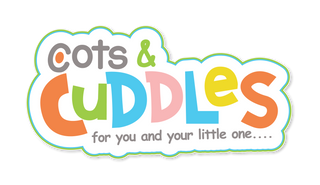Introduction:
Motor skills development refers to the progression and refinement of a baby's physical abilities and coordination, particularly involving their muscles and movements. It encompasses both gross motor skills, which involve larger muscle groups and whole-body movements, and fine motor skills, which involve smaller muscles and more precise movements. Motor skills development in babies is a crucial aspect of their overall growth and includes milestones such as rolling. Motor skills encompass a wide range of movements, from the basic actions of grasping objects and rolling over to more complex activities such as running, jumping, and manipulating small items. These skills are essential for a child's overall growth, as they support physical fitness, coordination, and body awareness. Moreover, motor skills are closely intertwined with cognitive development, impacting problem-solving abilities, spatial awareness, and sensory integration.
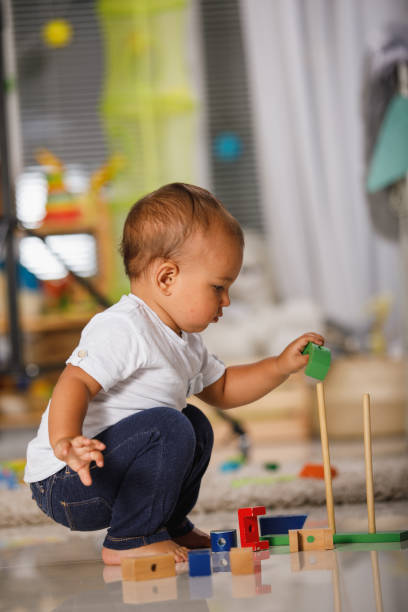
Mothers play a vital role in their child's motor skills development, as they are the primary caregivers during these formative years. However, it can be challenging to navigate this aspect of parenting, especially when faced with the unique problems that arise when nurturing babies. In this comprehensive guide, we will explore the different aspects of motor skills development in babies, providing valuable insights and guidance to mothers. We will address the definition and importance of motor skills, the specific types of motor skills involved, and the developmental milestones that mark a child's progress. Additionally, we will delve into the common problems faced by mothers during this stage and provide effective strategies to overcome them.
By understanding the intricacies of motor skills development, mothers can provide the necessary support and encouragement to help their babies thrive physically and cognitively. It is crucial to recognize that each child is unique and progresses at their own pace, so this guide aims to empower mothers with the knowledge and tools needed to foster their toddler's motor skills development effectively. Throughout this blog, we will explore various sections and sub-sections that will delve deeper into each aspect of motor skills development. From understanding the definition and importance of motor skills to addressing common challenges and offering practical strategies, you will find a wealth of information to assist you on this exciting journey of nurturing your child's physical abilities.
Let's embark on this exploration of motor skills development in babies, empowering mothers to support their toddlers during this critical phase of growth.
Understanding Motor Skills Development
Understanding Motor Skills Development also encompasses recognizing the importance of motor skills in a child's overall growth and independence. Motor skills contribute to various aspects of a child's physical and cognitive development, including coordination, balance, spatial awareness, hand-eye coordination, and fine motor control. It enables children to explore their environment, engage in physical activities, perform self-care tasks, and develop the foundation for future learning and independence.
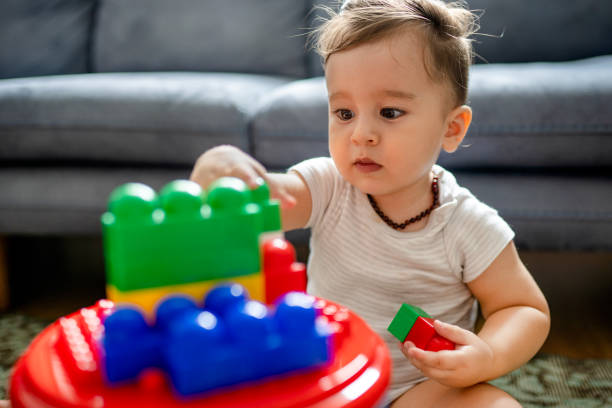
1.1: Definition and Importance of Motor Skills
Motor skills refer to the ability to control and coordinate the body's movements. They are categorized into two types: gross motor skills and fine motor skills. Gross motor skills involve larger muscle groups and enable activities such as crawling, walking, running, and jumping. On the other hand, fine motor skills involve smaller muscle groups, particularly in the hands and fingers, and allow for tasks like grasping objects, drawing, and buttoning clothes.
Motor skills development plays a vital role in a child's overall growth and independence. By acquiring and refining these skills, children can explore their environment, engage in physical activities, and perform essential daily tasks. Developing motor skills contributes to improved coordination, balance, spatial awareness, hand-eye coordination, and cognitive abilities.
1.2: Types of Motor Skills
Motor skills can be broadly classified into two main categories: gross motor skills and fine motor skills.
-
Gross Motor Skills: Gross motor skills involve the movement and coordination of larger muscle groups. These skills are fundamental to activities that require whole-body movements. Examples of gross motor skills include crawling, walking, jumping, climbing, kicking a ball, and riding a tricycle. They form the foundation for physical activities and enable children to explore their environment.
-
Fine Motor Skills: Fine motor skills involve the precise control and coordination of small muscles, particularly in the hands and fingers. These skills allow children to perform tasks that require dexterity and hand-eye coordination. Fine motor skills include activities such as picking up small objects, holding a spoon, using scissors, writing, drawing, and buttoning clothes. These skills are essential for self-care, school readiness, and engaging in fine manipulative activities.
1.3: Developmental Milestones
Motor skills development progresses in a sequential manner as children reach specific milestones at different stages of their early years. These milestones provide a general timeline for the acquisition of motor skills, but it's important to remember that each child develops at their own pace. Here are some key developmental milestones related to motor skills:
-
0-6 Months: Infants develop basic motor skills such as head control, rolling over, and reaching for objects.
-
6-12 Months: Babies begin to sit unsupported, crawl, pull to stand, and explore their surroundings through movement.
-
12-18 Months: Toddlers start walking independently, climbing stairs with assistance, and developing hand-eye coordination through play.
-
18-24 Months: Children refine their walking skills, run, jump with both feet, and demonstrate improved fine motor skills like stacking blocks and using simple utensils.
-
24-36 Months: Toddlers show more advanced gross motor skills, such as kicking a ball, riding a tricycle, and climbing on playground equipment. Fine motor skills continue to develop, enabling them to draw basic shapes and use utensils more effectively.
Motor Skills Development in Babies
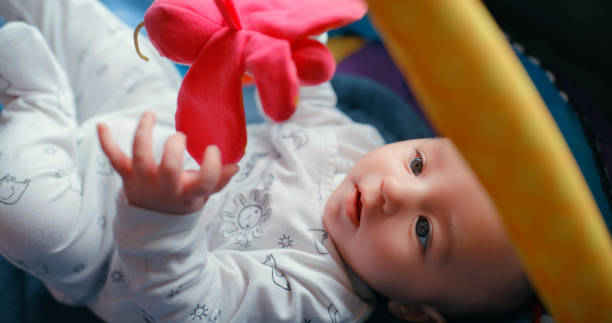
2.1: Gross Motor Skills
Gross motor skills involve the use of larger muscle groups to perform activities that require coordination, strength, and balance. During the age of 1 to 2 years, babies make significant progress in developing their gross motor skills. Here are some key aspects to consider:
-
Walking: Walking is a major milestone during this period. Most babies begin to take their first steps between 12 and 15 months. Encourage your little one by creating a safe and supportive environment for practicing walking.
-
Crawling: Crawling helps develop core strength and coordination. While not all babies crawl, it is an important precursor to walking. Encourage crawling through play activities that promote movement on hands and knees.
-
Balance and Coordination: Toddlers start to refine their balance and coordination skills during this stage. They may be able to stand on one foot briefly, kick a ball, or climb stairs with assistance. Encourage activities that challenge their balance and coordination, such as walking on a balance beam or playing with stacking toys.
2.2: Fine Motor Skills
Fine motor skills involve the coordination of small muscles in the hands and fingers, enabling babies to manipulate objects and perform tasks that require dexterity. Here are some important aspects of fine motor skills development:
-
Finger Dexterity: As your baby's fine motor skills progress, they will demonstrate increased finger dexterity. They might be able to pick up small objects, use their thumb and index finger in a pincer grasp, and stack blocks.
-
Hand-Eye Coordination: Hand-eye coordination becomes more refined during this period. Babies can engage in activities that involve reaching, grasping, and manipulating objects. Encourage hand-eye coordination through games like stacking rings or placing objects into containers.
-
Object Manipulation: Babies become more skilled at manipulating objects using their fingers and hands. They may attempt to scribble with crayons or turn the pages of a board book. Provide age-appropriate toys and activities that involve manipulating objects to further develop their fine motor skills.
2.3: Cognitive and Motor Skills Integration
During the early age, there is a significant overlap between cognitive development and motor skills. As babies explore their environment and engage in play, they strengthen both their cognitive and motor abilities. Here are some important points to consider:
-
Problem-Solving: Problem-solving skills start to emerge during this stage. Encourage your baby to figure out simple puzzles or engage in activities that require problem-solving, such as fitting shapes into corresponding holes.
-
Exploration: Babies are naturally curious, and their motor skills development benefits from exploration. Allow your little one to explore their surroundings, manipulate objects, and engage in sensory play. This enhances their cognitive development while strengthening their motor skills.
-
Imitation: Imitation plays a vital role in motor skills development and cognitive growth. Babies observe and imitate movements and actions they see around them. Encourage imitation through games like clapping hands, waving goodbye, or pretending to talk on a toy phone.
Common Problems Faced by Mothers
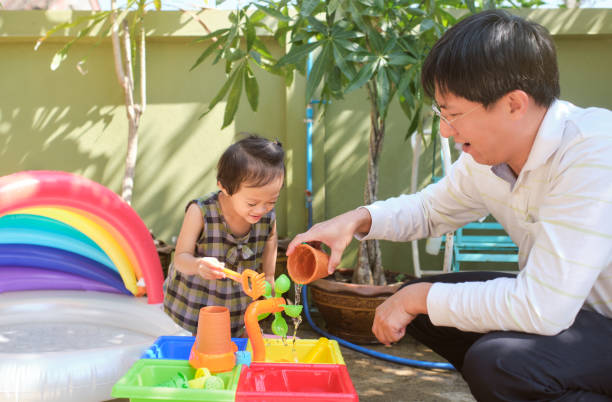
Mothers of toddlers often encounter various challenges when it comes to their child's motor skills development. Understanding and addressing these problems is crucial for providing the necessary support and ensuring healthy growth. Let's explore some of the common issues faced by mothers and how they can be effectively managed.
3.1: Delayed Motor Skills Development
Some babies may experience delayed motor skills development, which can be a cause of concern for mothers. It is important to be aware of the developmental milestones and recognize any significant delays. If your child is not reaching age-appropriate motor skills milestones, it is advisable to consult with a pediatrician or a developmental specialist.
Early intervention plays a vital role in addressing delayed motor skills development. Through targeted therapies and activities, professionals can help stimulate and enhance your child's motor abilities. Remember, each child develops at their own pace, so it is important to be patient and provide a nurturing environment that supports their progress.
3.2: Motor Skills Challenges and Solutions
Mothers often face various challenges when it comes to supporting their child's motor skills development. It is common for toddlers to struggle with certain skills or encounter roadblocks along the way. However, there are effective solutions and strategies to overcome these challenges.
One of the key solutions is to provide consistent support, encouragement, and praise. Positive reinforcement can boost your child's confidence and motivation, enabling them to persist in their efforts. Offering age-appropriate toys, puzzles, and activities that focus on the specific motor skills they are working on can also help them develop and refine their abilities.
If your child is facing significant difficulties, it may be beneficial to seek therapeutic activities or occupational therapy. These interventions can offer specialized guidance and exercises tailored to your child's unique needs, helping them overcome any hurdles they may be experiencing.
3.3: Parental Concerns and Anxiety
Mothers often find themselves grappling with concerns and anxiety regarding their child's motor skills development. It is natural for parents to compare their child's progress to others or worry about potential long-term effects.
To alleviate these concerns, it is essential to remember that each child follows their individual developmental trajectory. Focus on celebrating the small victories and milestones your child achieves rather than comparing them to others. Seek support from your pediatrician or parenting communities to gain a broader perspective and reassurance.
Additionally, self-care for mothers is crucial. Taking care of your own well-being, seeking emotional support, and maintaining a positive mindset will allow you to better support your child's motor skills development journey.
By addressing these common problems faced by mothers, we can create a supportive and nurturing environment that enables toddlers to flourish in their motor skills development. Remember, with patience, guidance, and appropriate interventions, you can help your child overcome challenges and reach their full potential.
Strategies for Supporting Motor Skills Development
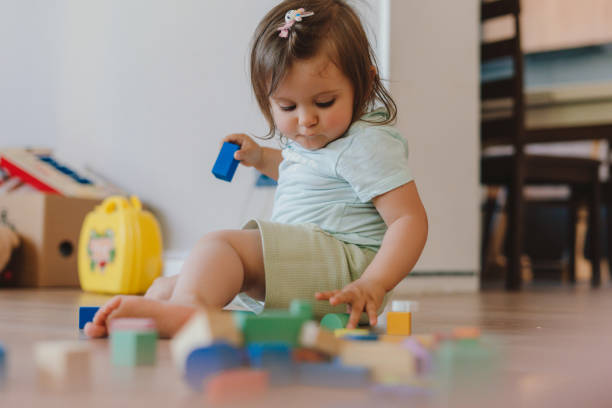
Motor skills development in babies requires a nurturing environment and intentional engagement. In this section, we will explore effective strategies to support your child's physical growth and enhance their motor skills. By creating a safe and stimulating environment, engaging in playful activities, and encouraging physical exploration and movement, you can facilitate their development. Let's delve into each sub-section in detail.
4.1: Creating a Safe and Stimulating Environment
A safe and stimulating environment plays a vital role in promoting motor skills development. Here are key strategies to consider:
-
Baby-proofing: Ensure that your home is free from potential hazards, such as sharp objects, unstable furniture, or small choking hazards. Install safety gates and outlet covers to create a secure space for your baby to explore.
-
Sensory stimulation: Provide a variety of sensory experiences to stimulate your baby's motor skills. Offer different textures, colors, and shapes through toys, play mats, and sensory bins. Engage their senses of touch, sight, and sound to enhance their cognitive and physical development.
4.2: Engaging in Playful Activities
Play is a powerful tool for motor skills development. Here are effective strategies to incorporate playful activities into your daily routine:
-
Age-appropriate toys: Choose toys that encourage grasping, reaching, and manipulation. Soft blocks, stackable rings, and activity boards with buttons can enhance fine motor skills. Push toys and ride-on vehicles can promote gross motor skills, such as balance and coordination.
-
Games and interaction: Engage in interactive games that involve movement and coordination. Peek-a-boo, patty-cake, and imitation games encourage your baby to explore their abilities. Provide positive reinforcement and celebrate their achievements to boost their confidence and motivation.
4.3: Encouraging Physical Exploration and Movement
Promoting physical exploration and movement is crucial for developing motor skills. Consider the following strategies:
-
Outdoor play: Take your baby outdoors to experience different terrains, such as grass, sand, or uneven surfaces. Allow them to crawl, walk, and explore the environment. Outdoor play not only enhances gross motor skills but also provides sensory stimulation and exposure to nature.
-
Tummy time: Encourage regular tummy time sessions to strengthen neck, shoulder, and core muscles. Place your baby on their tummy for short periods while supervising closely. Gradually increase the duration as they become more comfortable. Provide interesting toys or mirrors to encourage reaching and lifting their head.
Seeking Professional Guidance
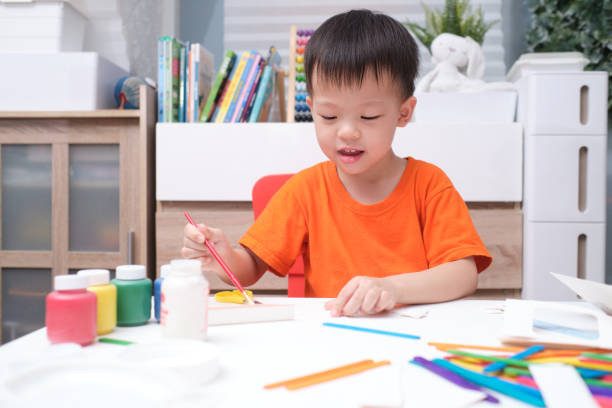
Seeking professional guidance is an important step in ensuring the optimal motor skills development of your baby. Consulting pediatricians and specialists, as well as considering early intervention programs, can provide valuable insights, assessments, and individualized support. Let's explore the sub-sections in detail:
5.1: Consulting Pediatricians and Specialists
Pediatricians and specialists play a crucial role in monitoring your baby's overall development, including motor skills. Regular check-ups with a pediatrician allow for early detection of any developmental delays or concerns. These healthcare professionals have extensive knowledge and experience in child development, enabling them to provide valuable advice and guidance tailored to your child's specific needs. They can address your questions, assess your baby's progress, and offer recommendations on activities, therapies, or interventions, if necessary.
When consulting pediatricians and specialists, be prepared to discuss your concerns and observations regarding your baby's motor skills development. This may include any delays, difficulties, or unusual behaviors you have noticed. They will conduct assessments, potentially using standardized tools or observation methods, to evaluate your child's motor skills and identify any areas of concern. Based on their findings, they can provide guidance on appropriate interventions or refer you to other specialists, such as occupational or physical therapists, for further evaluation or therapy if needed.
5.2: Early Intervention Programs
Early intervention programs are designed to provide specialized support and therapy for infants and toddlers who demonstrate delays or difficulties in their motor skills development. These programs typically involve a multidisciplinary team of professionals, including occupational therapists, physical therapists, speech therapists, and developmental specialists. Early intervention services can be accessed through government-funded programs, private providers, or community organizations.
By enrolling your baby in an early intervention program, you can ensure timely and targeted interventions to address any identified motor skills challenges. These programs focus on individualized support, tailoring therapy sessions to meet your child's specific needs. Early intervention professionals will work closely with you and your baby, incorporating therapeutic activities, exercises, and strategies to stimulate motor skills development. They will also provide guidance and support for you as a parent, equipping you with tools and techniques to continue fostering your baby's progress at home.
It is important to remember that early intervention programs should be viewed as a collaborative effort between professionals and parents. Active participation, consistent attendance, and follow-through with recommended activities and therapies are essential for optimal results. By working together with the experts, you can enhance your baby's motor skills development and pave the way for their overall growth and well-being.
Conclusion:
In conclusion, as a mother, you play a crucial role in nurturing and supporting your child's motor skills development during their early years. By understanding the different types of motor skills, recognizing developmental milestones, and being aware of common challenges, you can effectively guide your toddler's growth. Throughout this guide, we have explored the definition and importance of motor skills, including both gross motor skills, which involve larger movements, and fine motor skills, which focus on smaller, more intricate actions. We have also discussed the integration of cognitive and motor skills, highlighting the connection between problem-solving abilities and physical exploration.
It is important to note that every child develops at their own pace. While there are general age-appropriate milestones, it is essential to remember that individual differences exist, and not all children will reach milestones at the exact same time. Comparisons and parental anxiety can be detrimental to both your well-being and your child's progress. Instead, focus on creating a safe and stimulating environment that encourages exploration and play. If you notice delayed motor skills development or face challenges in supporting your child's physical abilities, it is advisable to seek professional guidance. Consult with pediatricians and specialists who can provide assessments and individualized recommendations. Early intervention programs may also be beneficial in providing additional support and therapy tailored to your child's specific needs.
Remember to create a safe and stimulating environment by baby-proofing your home and providing sensory stimulation. Engage in playful activities with age-appropriate toys and games that encourage both gross and fine motor skill development. Encourage physical exploration and movement through activities like outdoor play and regular tummy time. By implementing these strategies and staying attuned to your child's needs, you can effectively support their motor skills development and foster their physical and cognitive growth. Celebrate each milestone achieved, no matter how small, and remember that your love, patience, and encouragement are invaluable in your child's journey toward reaching their full potential.
